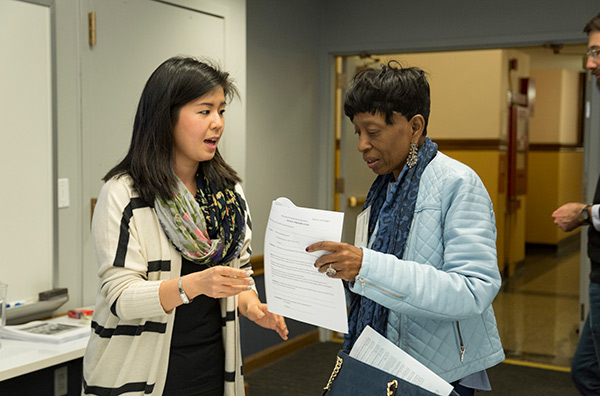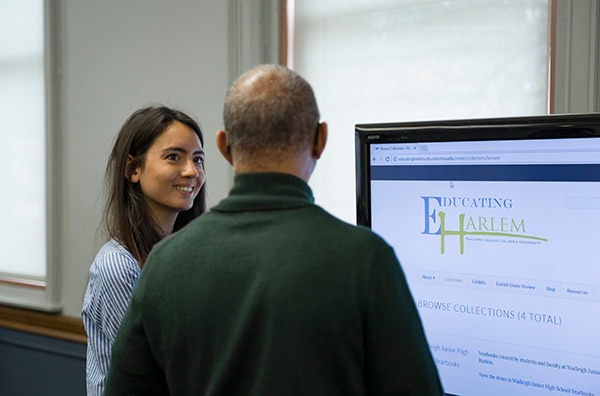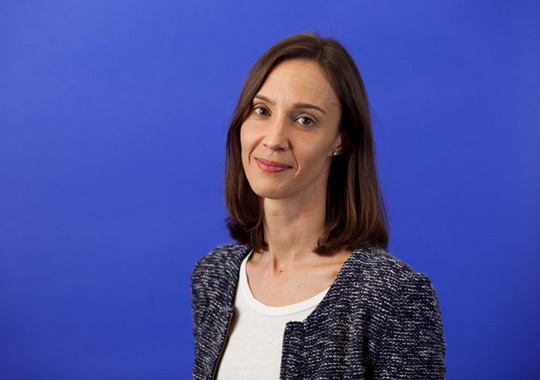Learning to “Be the Best at Who You Are”: Alumni of The Modern School share its life lessons with students in TC’s Educating Harlem Project

De Cuevas was one of nearly 50 Modern School alumni who came to TC to reconnect with schoolmates and bring documents and photographs to be digitized by students in TC’s History & Education program. The digitized materials will be added to Educating Harlem, a collaborative investigation into the history of education in 20th-century Harlem sponsored by TC’s Program in History & Education, the Institute for Urban and Minority Education (IUME), and the Center on History and Education. Eight alumni sat for videotaped interviews conducted by TC students from various programs.
“Oral history is crucial for telling these more complete stories about education in Harlem, as the existing archival record – in newspapers, in manuscript collections, in the Board of Education’s papers – is neither comprehensive nor thorough enough,” said Ansley T. Erickson, an Assistant Professor of History and Education and Director of the History & Education Program. “Individuals’ stories not only help us understand more about institutions like The Modern School, but provide a window into what these schools meant in the lives of individuals and communities.”
“Oral history is crucial for telling these more complete stories about education in Harlem, as the existing archival record – in newspapers, in manuscript collections, in the Board of Education’s papers – is neither comprehensive nor thorough enough.”
— Ansley T. Erickson, Assistant Professor of History & Education
The event, “Education and Class in Harlem: A Historic Overview of The Modern School,” featured a panel discussion that included Deidre Flowers, a 1981 alumna of The Modern School who has since received her Ph.D. in TC’s History of Education program; and Modern School alumni Robert North, Juanita Coleman-Merritt, and Victoria Horsford. Also on the panel were Daniel Perlstein, a historian at the University of California at Berkeley; and Melanie Edwards, a former staff member at The Modern School and the daughter of Mildred Johnson Edwards, the school’s founder.

“Our Educating Harlem project has been prompted from the start, in part by the fact that the historical images that we have – as scholars, as citizens, as New Yorkers – of education in Harlem are incomplete,” Erickson said. “We need more robust, more humane, more varied images of how Harlem residents defined their educational goals and sought to realize them.”
In the panel and open sharing, alumni remembered the school, which operated at 411 W. 154th and 437 W. 162nd St. in Harlem’s Sugar Hill section, as a beacon of progressive education and refinement that celebrated African-American and Caribbean culture. They remembered Mildred Edwards as a loving but strict disciplinarian who demanded unstinting effort and performance from students but also bolstered their self-esteem, fostered pride in their race, and celebrated their uniqueness and accomplishments. They said the school motto, “Be the Best at Who You Are,” was emblematic of Edwards’ philosophy.
“We learned about plants, how to dance, how to present yourself, to speak to people. We learned about singing, about the voice, we learned about just everything. It was a magical, magical experience.”
— Juanita Coleman-Merritt
But the school was not just focused on academic performance or the contributions of African and Caribbean cultures to America. Alumni recalled an ambitious, full-length performance by eight-year-olds of The Taming of the Shrew and productions of Macbeth, The Mikado and Carmen. The students were taught public speaking, how to curtsey, and how to set a formal table.
“Mildred believed in the whole child,” said panelist Juanita Coleman-Merritt, Ph.D. (class of 1956), a retired educator and administrator from Los Angeles. “She didn’t want you to just learn reading and writing; she wanted you to learn how to be in the world. We learned about plants, how to dance, how to present yourself, to speak to people. We learned about singing, about the voice, we learned about just everything. It was a magical, magical experience.”

Listening “positions teachers not as outside experts coming in to deliver instruction, but as people who … respect and have things to learn from the communities where they also teach,” Erickson said.
Traci McCracken (Class of 1981) said she was using The Modern School’s methods of exposure to the arts with her daughter. “A big part of The Modern School was the ability to recognize the importance of the arts in education and how that exposure also made us more well-rounded young people and adults,” McCracken said, adding that passing those lessons on to her daughter has become more important “as funding for the arts is all but erased.”
“The cooks, the office staff, the teachers, the aides – everybody in the school were on the same page. And the expectations for all of us were that we would do great things,” she said. “Before I close my eyes, I want to see another Modern School.”
— Diane Matthews
The need to pass along the lessons of The Modern School has also prompted alumna Diane Matthews (Class of 1970), a special education teacher in the Bronx, to take steps to start a charter school which she will call The Modern School of Innovation, for grades six through 12. Matthews said her school would have a demanding 21st-century curriculum but replicate what she said was the most essential aspect of her experience at The Modern School in the 1960’s: respect. “The cooks, the office staff, the teachers, the aides – everybody in the school were on the same page. And the expectations for all of us were that we would do great things,” she said. “Before I close my eyes, I want to see another Modern School.”
Teachers College students are preserving The Modern School’s history so that educators like Matthews will have a map for future schools, and so that TC students who are trained historians and teachers can follow its historic path.
“Historical interpretation is always complex, and ethically weighty,” Erickson said. “With an experience like this one, there’s no way they can avoid thinking deeply about what it means to be involved in telling other peoples’ stories.” – Patricia Lamiell
Published Tuesday, Jun 27, 2017